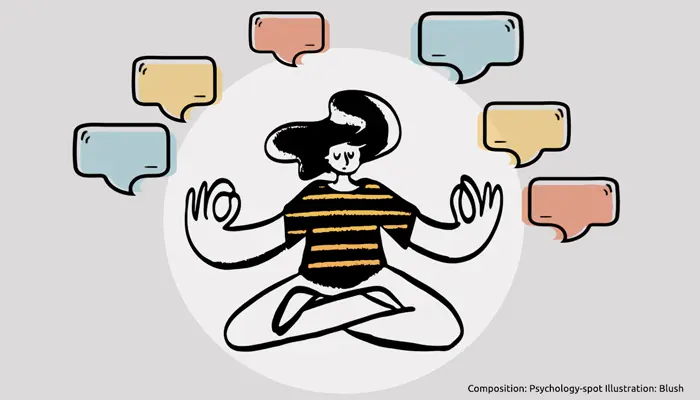
“A young and good martial arts student was learning under the tutelage of a famous master.
One day the master was observing a practice session in the yard and realized that the presence of the other students was interfering with the young man’s attempts to refine his technique.
The master could perceive the young man’s desire to show himself as an expert to the others and his frustration for failing to do so. He approached and gave him a pouch on his shoulder.
– What’s the problem? – asked.
– I don’ know – said the young student visibly tense. – No matter how hard I try, I can’t do the movements properly.
– Come with me, I’ll explain it to you – said the master.
The master and the student came out of the building and reached a torrent. The master remained silent on the shore for a while and then spoke.
– Look at the stream. There are stones in its path. Is it trying to impress them? Do it perhaps bump against them for frustration? It simply flows and continues its path. Be like the water.
The young man took note of the master’s advice and within a few days he barely noticed the presence of other students around him. Nothing could affect his way of performing the movements, which were becoming more and more perfect”.
This beautiful story tells us of the need to find balance and inner peace instead of trying to impress the others and get their approval. In fact, when we depend on the acceptance of others, there is a contradiction: the more we seek it, the more it becomes impossible to obtain and we are less considered.
The parable uses water as a resource by the way that in Buddhist philosophy it has a special symbolic value because it perfectly incorporates its teachings. The water flows constantly, adapts to the shapes of the containers and overcomes all kinds of obstacles. It is its ability to adapt without losing its essence that makes it so special.
The risks of seeking approval from others
1. We move away from our essence more and more. When we seek approval from others, we suppose that some of our features will not be accepted, so we try to hide them. We wear a social mask that moves us away from authenticity and “compels us” to interpret a character. Of course, living in this “theater” is tiring because we have to continually repress many of the thoughts, attitudes and emotions we naturally feel.
2. We live on an emotional roller coaster. When the opinion of others becomes the compass that guides our steps, we volunteer get on an emotional roller coaster because our mood begins to depend directly on external evaluations. We feel happy whether we are flattered or deeply unhappy and frustrated if we are criticized or refused. At that point, we are no longer owners of our emotions and we give the control to others. We become reactive people to the mercy of others.
3. We forget our dreams. It is something terrible, so terrible that we normally erase it from our mind, but when our life revolves around the approval of the others, we abandon our dreams and plans to fit and embrace the goals of others. In this way we end up losing intrinsic motivation, which is our driving force and lose our passion. So we end up living the lives that others want, not the life we want.
Can you be yourself without “hurting” others?
One of the obstacles facing people on the road to authenticity and personal liberation, is the fear of make suffering people they love. However, grow up, pursue our dreams, be independent and feel good with ourselves, should not be problems for the others. Conversely, if they really love us, they should be happy to see us grow and realize our dreams.
The problem is that when we create a relationship of dependency with someone looking for his approval before making decisions, from the most insignificant to the most important, we are giving him a huge power on us. Many people feel comfortable in that role, they feel pleasure in having power over our lives and do not want to break that bond. But often these people become more and more demanding, they are getting closer and their need to control becomes disproportionate. In these cases, break the bond is a question of psychological survival.
Of course, when we become independent, begin to want different things and make our decisions, these people will be “disappointed” because they want to maintain the bond of dependence. In a sense, the disappointment is a form of emotional manipulation. In fact, we must remember that often the bonds that keep us together are also the ones that imprison us the most.
In those cases you should not be afraid to “hurt” that person because you are not really doing anything wrong, but you are giving him an opportunity to mature. You are elevating the relationship to a higher level where there is no dependence, but there are two mature people who love to stay together enjoying each other’s individuality without toxic dependencies.
Do not be yourself, be the better version of yourself
One of the worst advices we can recive is to be encouraged to be ourselves. We must keep in mind that many people have been successful as they are, but many others have failed miserably. Many people were happy being themselves, but others were deeply unhappy.
The wisest advice is: be the best version of you. This does not mean that we should give up our essence, but we must learn to give the best of us. For example, being a person prone to anger at the end will bring only problems, besides making us feel bad. This does not mean that we should hide disappointments or sorrows, but we must express them in an assertive way. The goal is not to please the others but to be able to handle our emotions because, accumulating hatred and resentment will end up damaging us.
The secret for being the best version of ourselves is very simple: when we have developed a good inner equilibrium, we know exactly what we want from life and we are in peace with ourselves; all this translates into each of our actions and allows us to relate ourselves more safely and authentically.
In fact, being authentic does not mean to explode when we feel angry and frustrated or say the first thing that comes to mind without reflecting on the consequences, this is simply a childish behavior.
According to Jean Paul Sartre: “Who is authentic assumes the responsibility of what he is and recognizes himself free to be what he is”.
The authentic person practices congruence, expresses what he feels and thinks assertively. However, authenticity is not confined to congruence, it is not simply “being oneself”, but it also implies a deep inner knowledge, the ability to assume responsibilities, and a solid self-esteem that does not depend on the opinions of others.
The authentic person is sensitive to the emotions and opinions of others, it could not be otherwise, but decides not to subordinate his decisions to their judgments and criticisms. The most interesting thing is that when we’re fine with ourselves, when we are mature and have a profound knowledge of ourselves, the others notice it and we get their respect and admiration, although this is not the ultimate goal.



